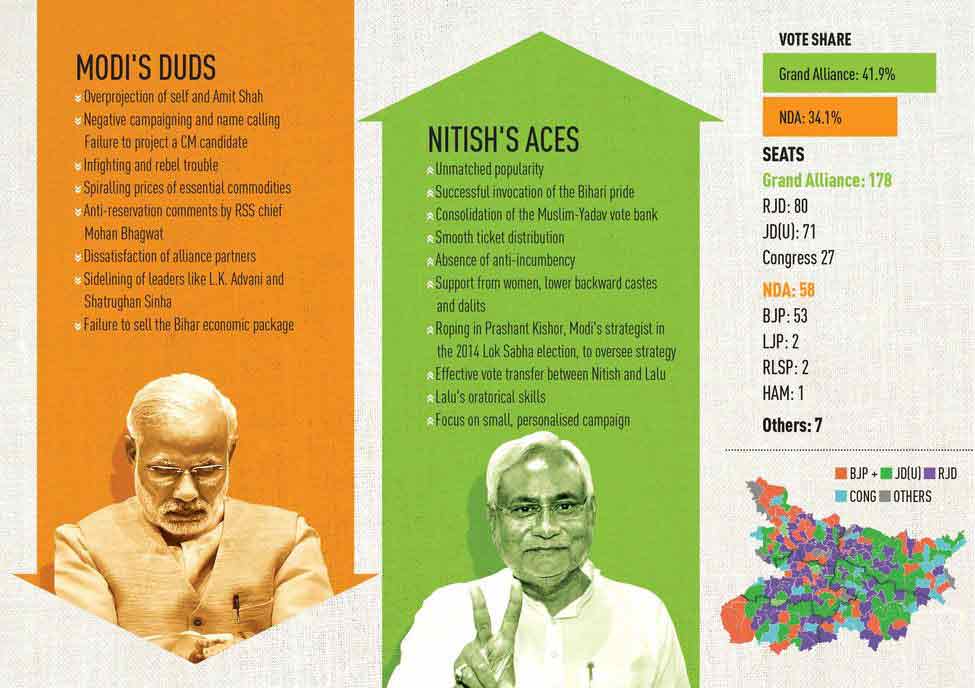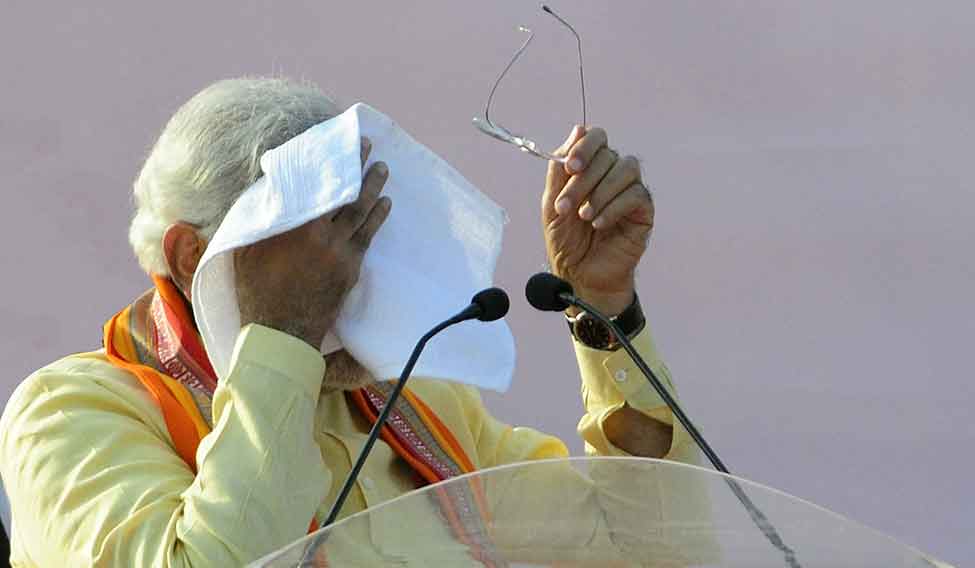Girls in school uniforms pedalling away on their bicycles is an imagery that Bihar Chief Minister Nitish Kumar has elevated to the status of an icon of development. That image was on top of his mind on November 7, a day before the counting of votes of the assembly elections, when he invited the members of the Indian Political Action Committee, which designed his election campaign. It seemed a formal signing off and a thank you meeting with the team, which had been with him in Patna since February, working 15 hours a day. However, much of his interaction with them, said IPAC's director Rishiraj Singh, was about educating children and building roads.
It became clear the next day that the people of Bihar believed Nitish's imagery, as he stormed back to power with a thumping victory that reduced the BJP, the main opposition party, and Prime Minister Narendra Modi, its chief campaigner, to damp squibs. The day after the defeat, Modi attended the BJP's parliamentary board meeting in Delhi. Members spoke as if reading from an unwritten script—we lost because they won!
Modi and BJP president Amit Shah, who almost exclusively ran the entire campaign of the party, made no attempt to take responsibility for the humiliating defeat. This infuriated the party veterans, who had been sidelined since the Modi-Shah duo took charge, and they decided to call a spade a spade—something that Shah had ensured that Union ministers, young MPs and party's chief ministers did not dare do. Led by former deputy prime minister L.K. Advani, the veterans issued a strongly-worded statement, demanding a thorough review of the defeat and questioning the fairness of people sitting in judgment of their own role.
It is said that former party president Murli Manohar Joshi had told the Rashtriya Swayamsevak Sangh about the disenchantment among the senior leaders in Delhi over the Modi-Shah duo in the thick of Bihar campaign and the mood of rising intolerance. Apparently, the RSS decided to leave the issue alone till the results were out. When the BJP lost, the party did not wait to assert that RSS chief Mohan Bhagwat's suggestion that reservation be reviewed had not impacted the poll. But the RSS did nothing to assuage the hurt and allay the apprehensions. By the time it woke up to the reality, it was too late to stop Advani and company.
Not that Modi and Shah were left without support in the party. While BJP general secretary Ram Madhav thought people had fallen into the trap of perception, Home Minister Rajnath Singh rushed in to ensure that Modi did not become the face of the drubbing that the NDA took. He said the defeat in no way reflected on the prime minister or his government.
In sharp contrast, Nitish was an island of tranquillity in a sea of tumult on the counting day. When the initial trends predicted an advantage for the BJP, he calmly asked people to wait and watch. When the media started congratulating him after it became clear that he was winning, he asked them to talk to him only after the Grand Alliance got a clear majority. And, when it was formally announced that alliance had got a fabulous figure of 178 seats, he told the media it was a mandate for development and indicated people's aspirations. “There is a growing desire in the country for a strong opposition,” he said. “It is also the requirement for a functioning democracy.”
It was a lesson learnt the hard way for the BJP. A source in the party hinted at the possibility of not making the prime minister the face of every assembly election campaign. “That brought to the table issues like black money, which they may or may not be able to bring back,” he said. “It was articulated much in the way Modi had during his Lok Sabha campaign in 2014. In campaign mode, Modi said he would bring it back and credit it to every Indian's account. Now many have new accounts, but the money is obviously not in. Where is it? they asked.” Modi's campaign talk of 2014 became the measuring yardstick at a time when the price of dal crossed Rs.200 a kilo.
Many footsoldiers of the BJP in Bihar now attribute the defeat to the invectives and abuses that Modi and Shah used during the campaign. “We were foolish to not even own up the good work of the Nitish Kumar-led NDA government,” said a party member from Araria. Their badmouthing of Nitish and Rashtriya Janata Dal leader Lalu Prasad, he said, did not go down well even with BJP members. “He [Lalu] is a Bihari, and in abusing him, you are hurting Biharis. That close-knit we Biharis are. They call it casteist,” he said.
 Graphics: Binesh Sreedharan
Graphics: Binesh Sreedharan
The BJP's failure to control the rabid supporters and polarising statements evidently backfired. “If the RSS chief's suggestions on reservation did some damage, the PM made it worse by stating that the Grand Alliance will take it away from them and give it to Muslims,” said Bhola Singh, the BJP's Lok Sabha member from Begusarai. “And, the biggest mistake was suggesting that if the BJP did not win, Pakistan will celebrate. Bihar is not Uttar Pradesh.” He had earlier said that Modi's language during the campaign was “cheap and undignified”.
The Modi-Shah duo's overconfidence that the BJP was going to win with or without local leaders alienated every party leader in the state. The leaders parachuted from Delhi did not help, either. “[Union Minister] Rajiv Pratap Rudy can fly in, but he can hardly land here. Many of the leaders brought in won in the Modi wave in the Lok Sabha elections. Otherwise they would have been only in the Rajya Sabha,” said a partyman who worked for Vinay Kumar Singh in Sonepur. Singh lost to the RJD candidate.
In desperation, Modi even threw the idea of federalism to winds and almost promised that grants from the Centre would flow into the state if the BJP was voted to power. Biharis were not impressed. “Bihar has never had the same party government as the Centre,” said Dinesh Singh, the JD(U)'s Saran district president.
In hindsight, the BJP's strategy was flawed. “We could have won if we said 'upar Modi, neeche Modi', and projected Sushil Kumar Modi as the chief minister candidate,” said a party leader. “But, what has happened is, this election did not even give us the chance to build our leadership. Everyone was disappointed at the way Delhi leaders had to be looked after while we slogged.”
It was only towards the fag-end of the long-drawn elections that the party curtailed the PM's visits and removed his posters. But, by then, the damage had been done. According to author Usha Kiran, Biharis just did not like the fact that Biharis were being bashed on their soil by baharis (outsiders). “It was the same old kind of voting, with the sum of the members who formed the Grand Alliance being more than what the BJP got. That time they got together against Mrs Gandhi, this time against Modi,” she said, referring to Indira Gandhi's defeat in the election after the Emergency.
Nitish's campaign contrasted with Modi's. The chief minister was quietly dignified and maintained a positive body language throughout. And, not a single coarse word. He raised issues, and was ready before the media with the counter narrative and statistics after the PM left Bihar. At his rallies, he never mentioned any party by name or urged voters to vote for a particular symbol—if they were satisfied with the development work done by him, bring him back to power. It hit the target—people's hearts, minds and votes. The alliance rode on him, and he touched every constituency. And, as they went along, his campaign team decided to “tap the natural instincts of the two personalities”—Nitish and Lalu.
A post-poll analysis indicated that the JD(U) was the best in transferring votes. That is, Nitish's followers voted for the Congress and the JD(U). Navin Kumar, JD(U) general secretary, said people did so because they wanted Nitish back as chief minister. Even Lalu seemed committed to the goal. He, too, covered all 243 constituencies. And, emerging as the largest party in the Grand Alliance has not altered his commitment.
It is, however, undeniable that the RJD's numerical advantage and the election of Lalu's sons—Tejaswi and Tej Pratap—have left the chances of a strain in the alliance at a later stage. But Dinesh Singh dismissed it. “They [Nitish and Lalu] started out together during the JP movement,” he said. “They had differences, but have sorted things out.”
For Modi, winning Bihar was crucial in managing the rest of his tenure as prime minister and delivering his promises. Not that he would have got the numbers to facilitate passage of bills in the Rajya Sabha, but the party's morale and motivation to win would have been higher. “It has come in the way of building the tempo required to win the next round of state elections, though this defeat does not mean we will lose the next one,” said a party leader. The government has been pathetic in reaching out to opposition parties to get crucial bills passed in Parliament. It had pinned hopes on winning all the states that go to the polls.
Modi knew the atmosphere of intolerance was hardly conducive for the party to win Bihar. Yet, he did nothing, not even symbolic measures. This, said a source, “added to the impression that the prime minister is not different from these people, who desire to communalise India for electoral benefits”. With such an impression, keeping the Modi magic alive seems a difficult proposition.
On the other hand, a win in Bihar would have “nailed the lie” and shown Modi as different from many of his teammates. It would have also given his frequent foreign travels a degree of respect.
Modi's campaign in Bihar raised questions about his stated position on federalism—CMs and PM make Team India. In rallies after rallies, the BJP hammered in the point that funds would flow and projects would move smoothly if the Centre and the states were governed by the same party. This could count among reasons why the Shiv Sena is angry with the coalition partner in Maharashtra and the Shiromani Akali Dal is toying with the idea of going it alone in Punjab. The loss would make the PDP a more aggressive partner of the BJP in Jammu and Kashmir.
The anti-Modi voices within the BJP, now couched as rumours, will take the form of whispers and will eventually be told on record by people unafraid of him. Modi and Shah will have to spend time battling “perceptions” within the party. It may not be long before the revolt by veterans is followed by others.
Modi's first slip was in Delhi in February, when the Aam Aadmi Party trumped the BJP in the assembly elections. Now that Bihar has confirmed that Delhi was no freak event, Modi no longer seems invincible. The opposition is so buoyed that the government is seeing a stormy winter session of Parliament ahead. And, that will only make fulfilling the promises a tougher job. In fact, the BJP's failure to pull off the promised reforms made Arun Shourie, who was a minister in the Atal Bihari Vajpayee government, say “People are remembering Doctor Sahib.” Dr Manmohan Singh must be smiling.







